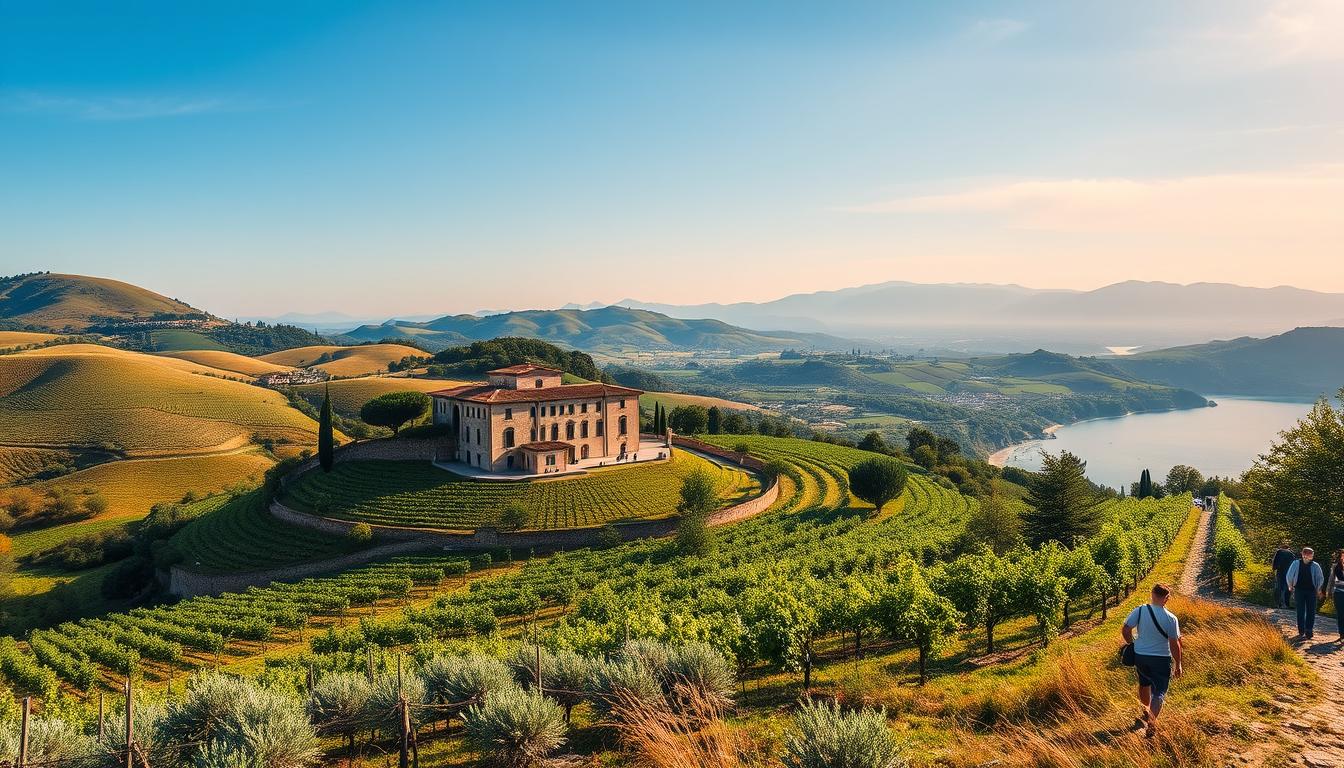Starting a travel agency focused on Italian adventures is a great chance for UK entrepreneurs. Italy has stunning landscapes and rich cultural experiences that attract adventurous travellers. A successful launch depends on understanding market needs and offering custom services.
This article will help you learn how to start a travel agency. You’ll discover how to do market analysis and use marketing strategies. It’s all about succeeding in the exciting world of adventure travel in the UK.
Key Takeaways
- Explore the unique opportunities within the Italian adventure travel market.
- Understand the importance of tailored services for your target audience.
- Recognise the need for strong local partnerships in Italy.
- Equip yourself with market analysis skills for informed decision-making.
- Implement effective marketing strategies for your agency’s success.
Understanding the Italian Adventure Travel Market
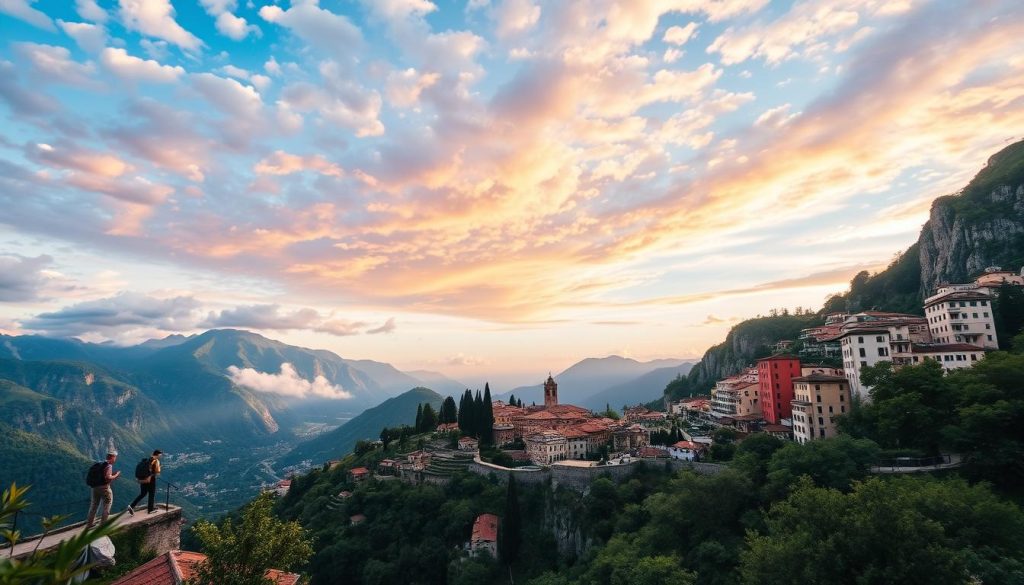
The Italian adventure travel market is changing fast. It’s now all about unique travel experiences. Eco-tourism, cultural immersions, and active pursuits are big now. People love hiking, cycling, and trying new foods.
UK tourists are especially keen on adventure in Italy. They enjoy trekking in the Dolomites and wine tours in Tuscany. This shows a big change in how people travel, wanting real experiences over just seeing sights.
Travel agencies need to get this to succeed in the adventure market. They should offer travel packages that match what people want. This could be for those who love adventure or those who want to learn about local culture.
Identifying Your Target Audience
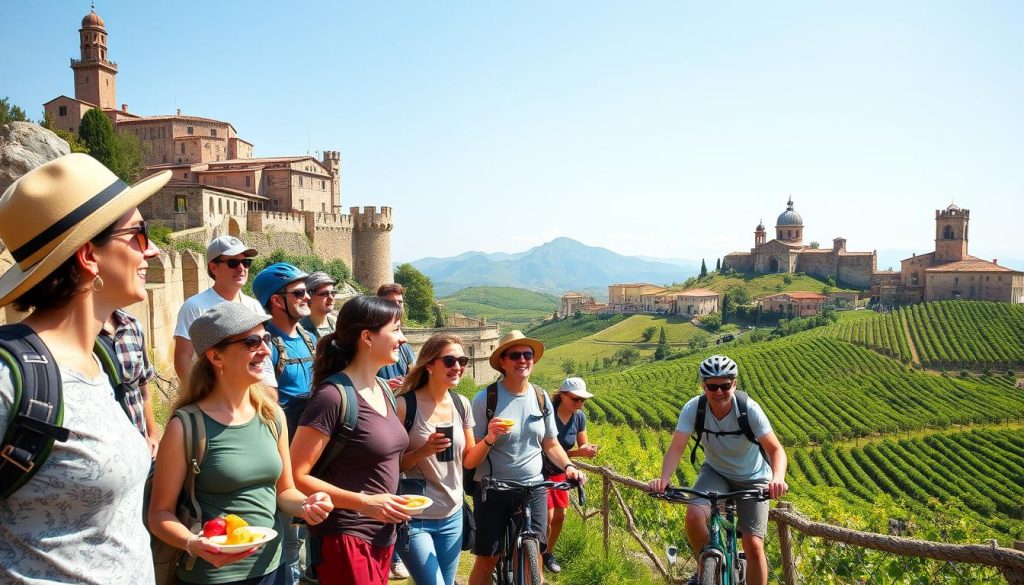
Finding the right audience for an Italian adventure travel agency is key. It helps create offers that speak to potential clients. Travel agencies need to look at different groups, like age, interests, and how much people can spend.
Recently, more young people are looking for unique travel experiences. They want to explore places that most tourists don’t visit.
To get better at targeting, think about these things:
- Age groups that love adventure travel.
- What they’re interested in, like hiking or trying new foods.
- How much they can afford to spend on travel.
Logistics matter too. Options for families and solo travellers can make a big difference. By knowing who might be interested, the agency can make marketing that really speaks to them. This way, they can make customers happier and more engaged.
Essential Steps for Starting a Travel Agency Specializing in Italian Adventures
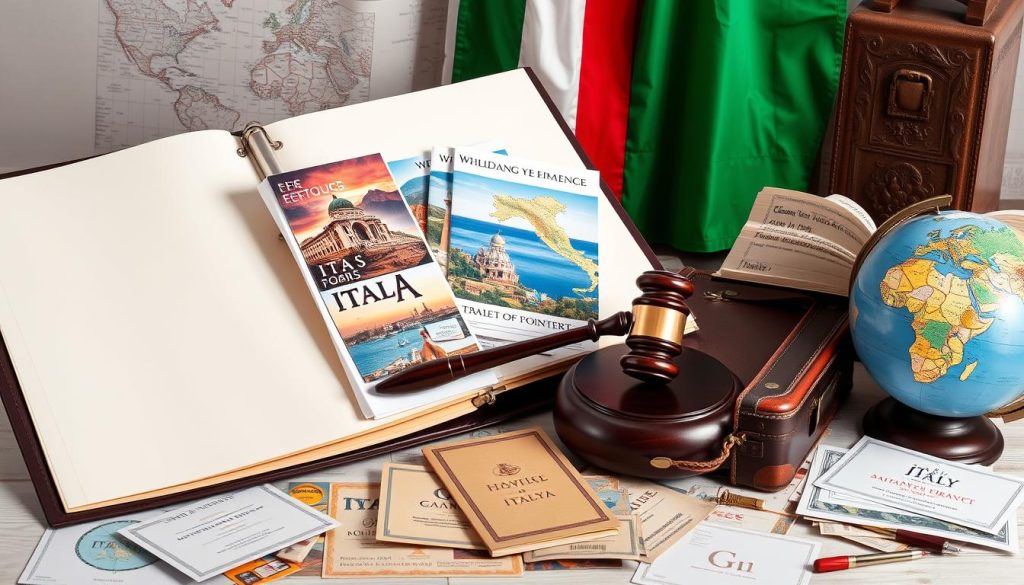
Starting a travel agency needs a deep understanding of key steps. First, you must navigate the legal world. This is vital for a compliant business. Knowing about travel agency legalities, like business registration and UK travel rules, is crucial.
Researching Legal Requirements
Setting up your travel agency means looking into UK travel laws. You need to:
- Register your business with the Companies House.
- Get the right licences and permits to operate legally.
- Follow consumer protection laws, like the Package Travel Regulations 2018.
- Seek advice from industry experts or groups like the Association of British Travel Agents (ABTA).
Knowing the legal side helps keep your business in line and builds trust with clients.
Choosing Your Niche
After sorting out the legal stuff, pick your travel agency niche. Focusing on a part of Italian adventure travel can make you more appealing. You could specialise in:
- Culinary tours that show off Italian food.
- Historical tours of Italy’s rich past.
- Eco-adventures that support green tourism.
- Custom trips for groups or families.
Specialising lets you build a unique brand. This makes marketing easier and attracts the right clients. Look at what others do to find a niche that shines in the adventure tourism world.
Developing Unique Adventure Packages
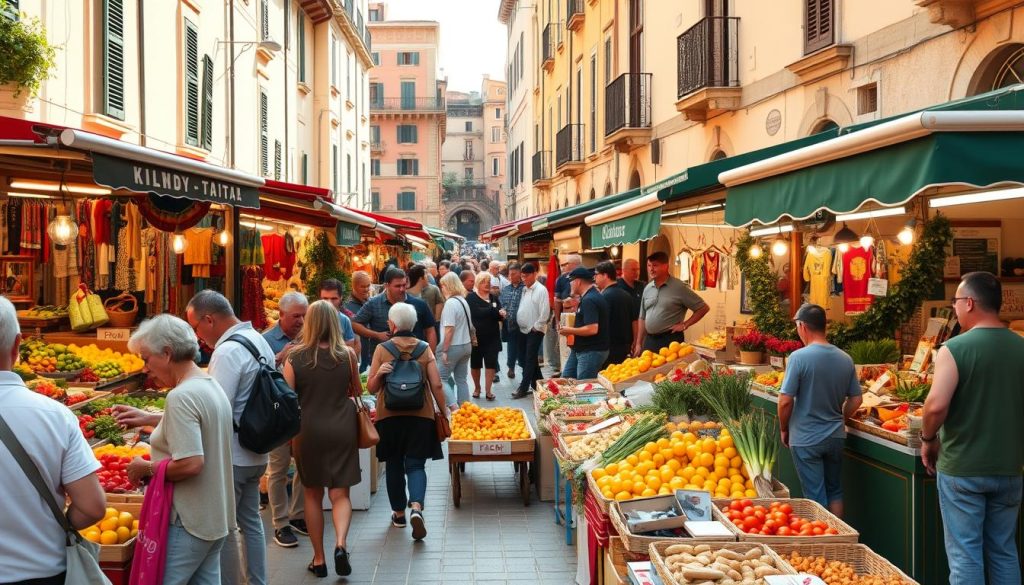
Creating unique adventure packages is key to drawing in travellers looking for real experiences. Adding local culture makes these packages more appealing. Working with local artisans, chefs, and historians helps create unforgettable cultural experiences. Activities like vineyard tours, cooking classes, and historical tours show off Italy’s traditions, making the trip more special.
Incorporating Local Culture
Highlighting local culture is a big plus for sustainable tourism. It helps local communities and gives travellers a real taste of the place. When making adventure packages, think about these ideas:
- Workshops with local artisans to learn traditional crafts.
- Culinary experiences highlighting regional dishes.
- Seasonal festivals that celebrate Italian traditions.
These experiences help travellers connect more deeply with their destinations, making their trip planning more meaningful.
Planning Itineraries for Adventurous Travellers
Good travel itineraries mix activities and downtime for all kinds of adventurers. For example, a package might include hiking in Cinque Terre and then relaxing in coastal towns. Cyclists can explore Tuscany’s beautiful hills. Each plan should be flexible and tailored to what the client wants. Important things to consider include:
- Comprehensive logistics management.
- Inclusion of popular attractions and activities.
- Clear timeframes for each adventure.
By making sure itineraries are well-planned, agencies can make customers happier and more likely to come back. This is especially true for those looking for active travel packages.
Building Relationships with Local Suppliers
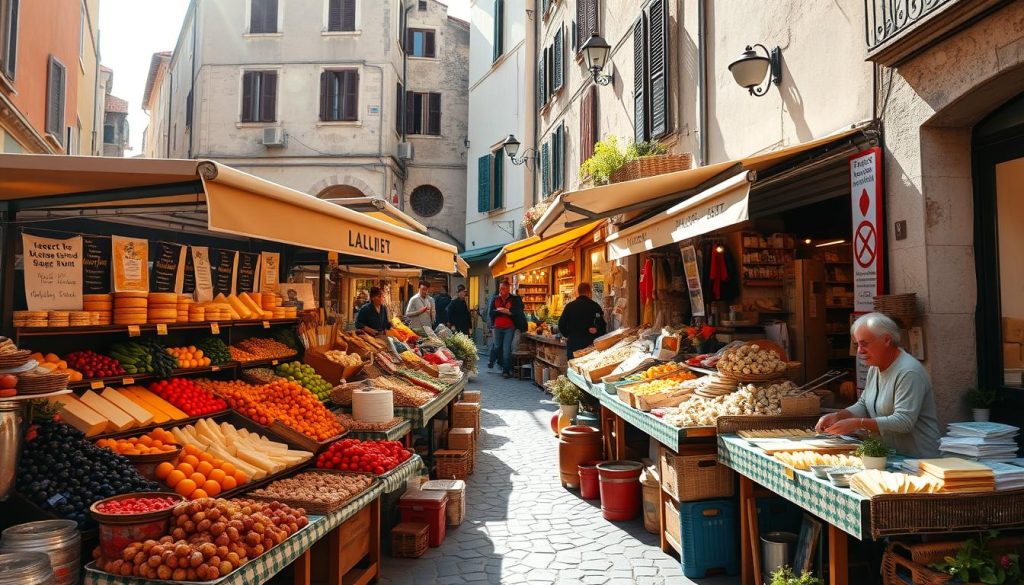
Creating strong ties with local suppliers is key for an Italian travel agency’s success. Working with Italian operators gives valuable insights into the area’s attractions. This helps in crafting unique and competitive travel packages.
Attending industry events and trade shows is also important. It leads to valuable partnerships that improve service quality.
Engaging with Italian Tour Operators
Forming partnerships with trusted Italian operators is essential. They offer local tips and recommendations, ensuring a real experience for clients. This helps in planning and executing tours smoothly.
Strong partnerships mean reliable support and a smooth journey for customers.
Finding Reliable Accommodation and Transport
Having secure accommodation partnerships is vital for a good customer experience. Working with well-known hotels, hostels, and transport services ensures a smooth trip. Choosing based on customer reviews and local tips helps find the best options.
Offering a variety of places to stay, from boutique hotels to agriturismos, meets different customer needs.
Creating a Compelling Online Presence
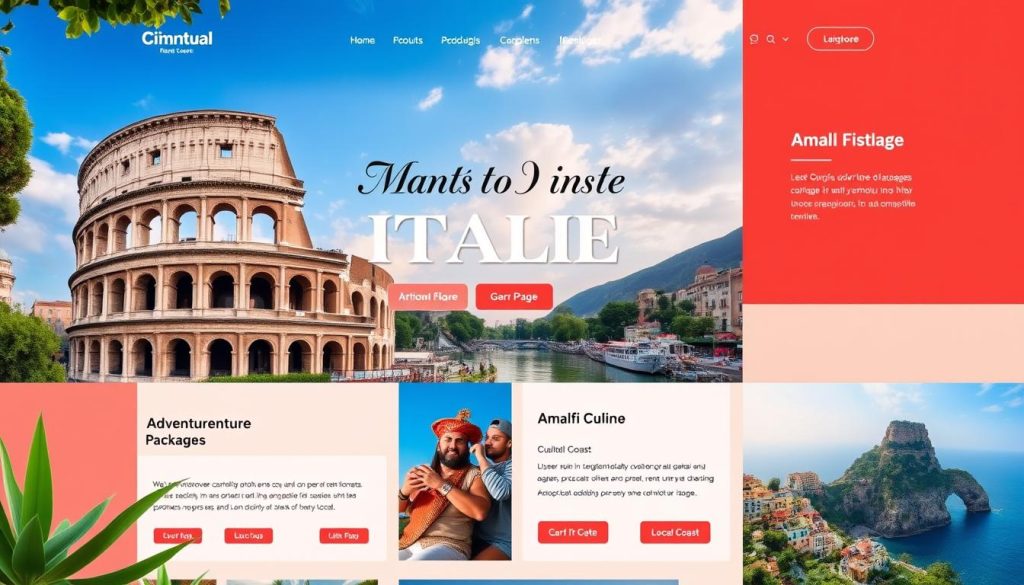
Having a strong online presence is key for any travel agency, especially those focused on Italian adventures. A well-designed travel website is the first step to attract customers. It must be easy to use, letting visitors find what they need quickly.
Designing a User-Friendly Website
Your website’s design should focus on simplicity and ease of use. This boosts customer engagement. Here are some tips to improve your website:
- Make sure it works well on all devices, especially smartphones.
- Use high-quality images and engaging content to draw visitors in.
- Make booking easy and straightforward.
- Use SEO to help more people find your site.
Utilising Social Media for Marketing
Social media is crucial for promoting your Italian travel agency. A strong online community can be built through effective engagement. Platforms like Instagram and Facebook are great for this. Here’s how to make the most of them:
- Post stunning visuals of Italy’s beauty and experiences.
- Share stories and reviews from happy customers.
- Work with influencers to reach more people and build trust.
- Encourage your followers to share their own travel stories.
Effective SEO Strategies for Your Travel Agency
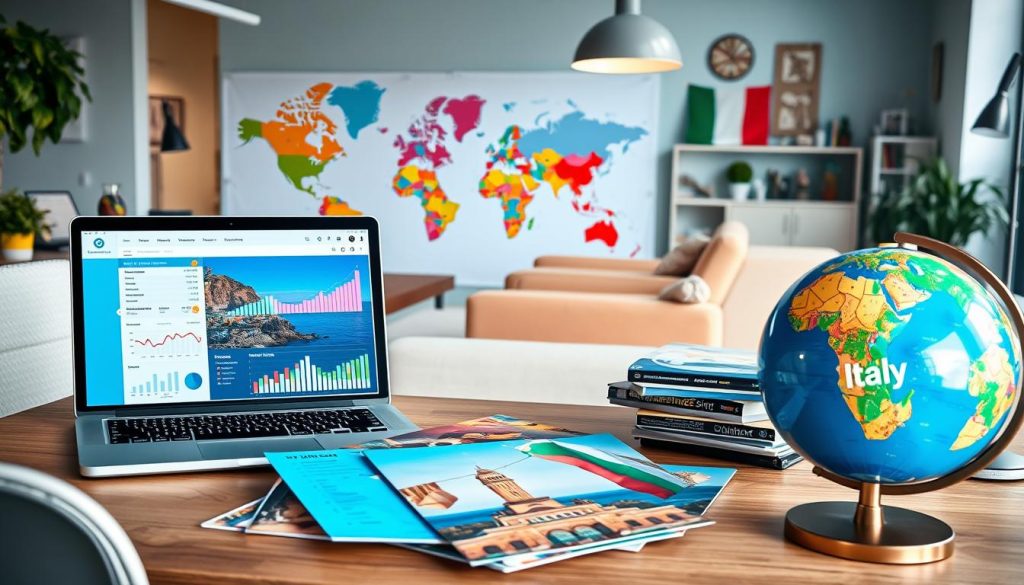
For a travel agency focused on Italian adventures, effective SEO is key. Start with thorough keyword research. Tools like Google Keyword Planner help find popular search terms in this niche.
Long-tail keywords attract targeted traffic. They help reach potential clients looking for unique travel experiences.
Keyword Research Techniques
Understanding what customers search for online is crucial. Focusing on travel agency SEO boosts site visibility. Long-tail keywords often lead to higher conversion rates.
Use methods like:
- Analysing competitor keywords
- Using local SEO terms related to Italian adventures
- Exploring search trends to align with popular queries
Optimising Content for Search Engines
Content optimisation is vital for SEO success. Make sure to optimise meta titles, headings, and image descriptions with the right keywords. A blog with tips, itineraries, and highlights is great for visitors and SEO.
Don’t forget about technical aspects:
- Improving site load speed for better user experience
- Incorporating internal linking for easier navigation
- Using on-page SEO techniques to increase visibility
Marketing Your Italian Adventure Travel Agency
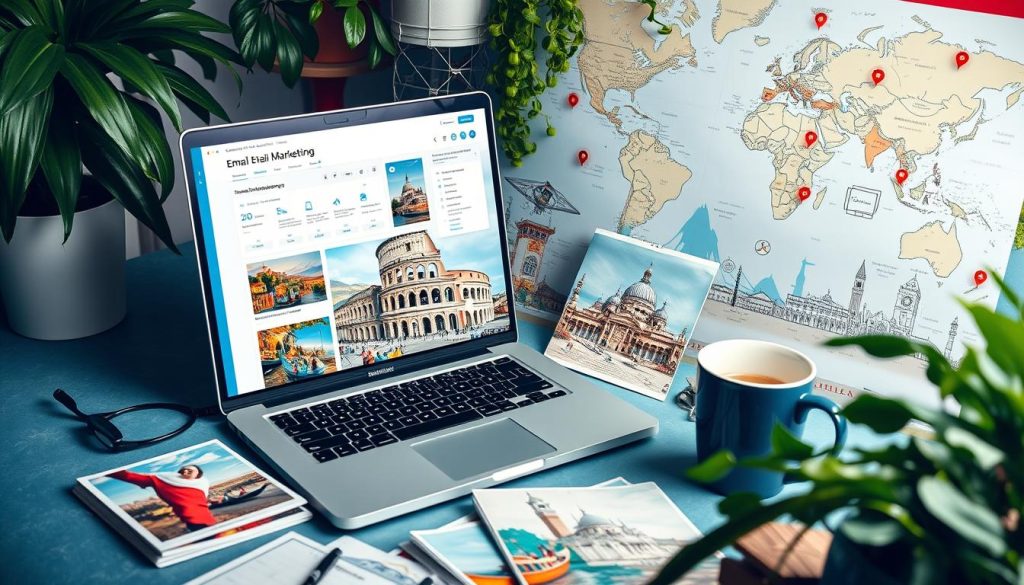
Marketing is key to a travel agency’s success. Using strong email marketing can keep customers coming back. Newsletters full of offers and travel tips help build loyalty and encourage repeat visits.
Leveraging Email Marketing
Targeted email campaigns can boost engagement. By understanding what your customers like, you can send them content that matters. Add great visuals and clear calls to action to make your emails stand out.
Regular emails help build trust and make your agency the first choice for travel.
Engaging with Travel Blogs and Influencers
Working with travel blogs and influencers can expand your reach. Partnerships with travel blogs bring your agency to new audiences. Influencer marketing adds a real touch to your brand, especially when they share their experiences.
Finding influencers who match your agency’s values creates powerful content. This content attracts adventure seekers, making them more likely to choose your agency for their next trip.
Understanding Financial Aspects of the Travel Business

Setting up a solid financial base is key for your travel agency. First, you need to look at start-up costs. These include things like registration, website creation, marketing, and operational expenses. A good financial plan helps you make a detailed budget that meets market standards.
Budgeting for Start-up Costs
Having a clear budget is like a map for your agency’s money. Start-up costs can change a lot based on different things. Your budget might cover:
- Business registration and licensing fees
- Website development and hosting
- Marketing and promotional materials
- Insurance and legal expenses
- Initial operational costs, such as office supplies
Doing deep market research helps guess costs and how much you can make. Using financial tools helps keep track of spending and income as your business grows.
Pricing Your Adventure Packages Competitively
Figuring out how to price your packages is crucial for success. Setting prices that are competitive but still make you money is key. To price your packages right, think about:
- Researching what others charge to see what’s fair
- Showing how your packages offer something special
- Changing prices with the seasons or for special deals
Talking about the value of your experiences helps convince people to pay. Finding the right balance between cost and profit can help your agency grow and get a good name.
Utilising Technology to Enhance the Travel Experience
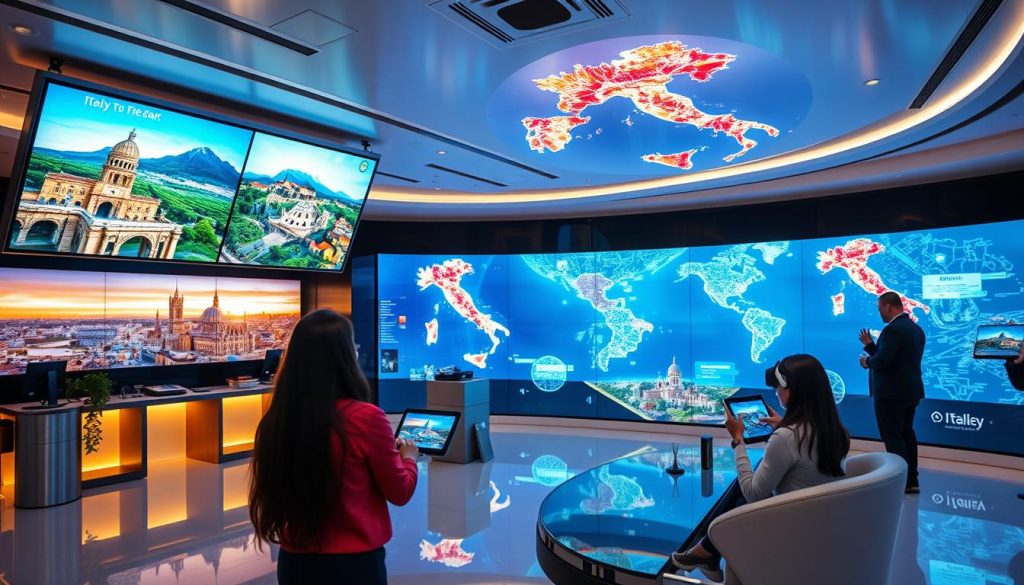
In today’s travel world, using technology is key to better customer experiences. Good booking system integration is vital for making bookings easier and meeting traveller needs. With the latest travel tech, processes are automated, and customer happiness goes up. This makes it simpler for travel agencies to offer top-notch services.
Integrating Booking Systems
Having a strong online booking system lets travellers see what’s available, manage their bookings, and get instant confirmations. Using software made for travel makes things run smoother. This cuts down on mistakes, making the experience better for everyone.
Using Mobile Apps for Customer Engagement
Mobile tech is changing how travel agencies talk to customers. Travel apps offer things like custom itineraries and quick updates. These apps add a lot to the travel experience. They even suggest places based on where you are, making your trip even more special.
Training and Hiring Staff for Your Agency
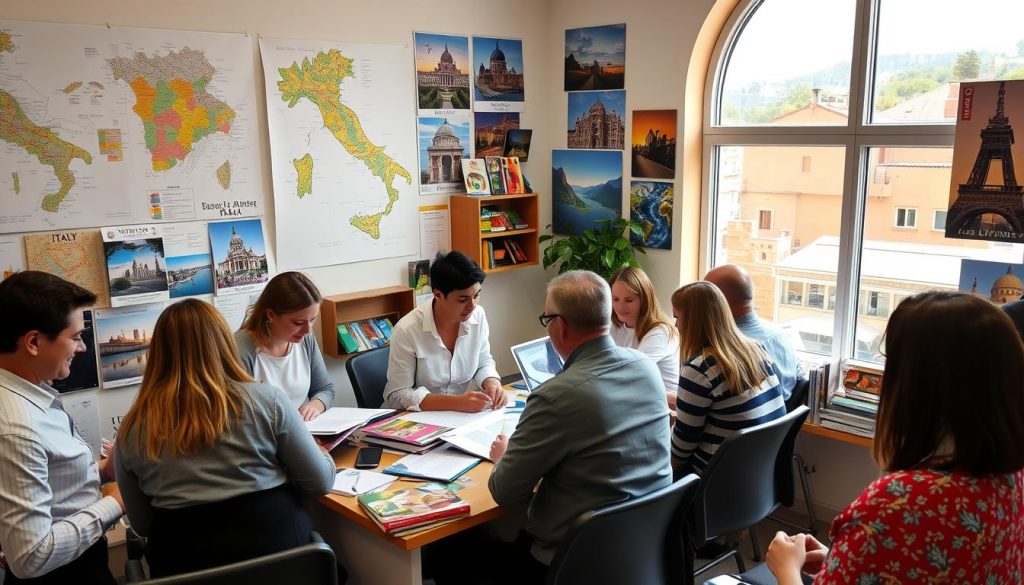
Managing your travel agency’s staff is key to top-notch service. Knowing the roles and duties helps build a team that meets client needs.
Identifying Key Roles and Responsibilities
Success starts with clear roles. Main roles include:
- Travel Consultants
- Customer Service Representatives
- Marketing Personnel
Each role has its own tasks that help the agency succeed. Clear expectations boost team work and service quality. A team that works together well can come up with new ideas to improve services.
Providing Training on Italian Culture and Experiences
Training is crucial for your team to give good advice. Knowing Italian culture and experiences helps staff interact better with customers. Training should cover:
- Workshops on Italy’s regions
- Sessions on Italian food traditions
- Training on adventure activities in Italy
This training makes your agency more credible and improves service quality. Staff can then offer richer experiences to clients.
Monitoring Trends in Italian Adventure Travel
Staying up-to-date with adventure travel trends is key to success. Travel agencies can use insights from groups like the World Travel & Tourism Council and the Italian National Tourist Board. These insights reveal new patterns and preferences. By keeping an eye on these trends, agencies can tailor their services to meet customer needs, staying ahead in the adventure travel field.
Keeping Up with Market Changes
Agencies need to watch current trends and predict future changes. They should study shifts in demographics and travel habits. This helps them understand what customers want. By being proactive, agencies can stay competitive in a rapidly changing industry.
Adapting to Customer Feedback
Customer feedback is also vital for improving services and strategies. Agencies should use feedback tools like surveys and online reviews. This helps them see how happy customers are and what needs to be better. Quick action on feedback shows agencies care about quality, building loyalty and encouraging more business.

